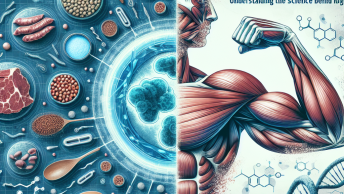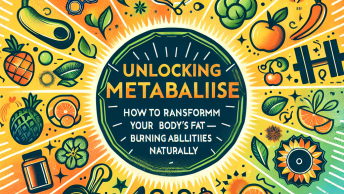When it comes to fat loss, countless myths and misconceptions swirl around, making it difficult to discern fact from fiction. Understanding these can be the difference between achieving your fitness goals and getting discouraged. In this listicle, we shine a light on 10 common fat loss myths and the facts that debunk them.
1. Myth: Carbs Make You Gain Weight
Fact: Carbohydrates alone don’t make you gain weight. Weight gain occurs when there’s a caloric surplus, meaning you consume more calories than you burn. The key is to focus on the quality of carbohydrates. Whole grains, fruits, and vegetables are nutrient-dense and beneficial for your health, while processed carbs can lead to weight gain if consumed excessively.
2. Myth: You Have to Exercise Every Day to Lose Fat
Fact: While regular exercise is important for overall health and can aid fat loss, it’s not necessary to work out every single day to see results. Consistency is key; even a few days a week can lead to significant fat loss if combined with a healthy diet. Additionally, incorporating rest days is essential for recovery and muscle growth.
3. Myth: All Fats Are Bad
Fact: Not all fats are created equal. Healthy fats, such as those found in avocados, nuts, and olive oil, are crucial for your body. They can actually help with fat loss by keeping you satiated and providing essential nutrients. The focus should be on limiting unhealthy trans fats and artificial fats often found in processed foods.
4. Myth: You Can Spot Reduce Fat
Fact: Spot reduction refers to the idea that you can lose fat in specific areas of your body through targeted exercises. Unfortunately, this is a myth. Fat loss occurs throughout your body in a more generalized fashion, based on genetics and overall body composition. Thus, a combination of full-body workouts and proper nutrition is far more effective.
5. Myth: Fat-Free Foods are Healthier
Fact: Fat-free or low-fat foods often contain added sugars and other fillers to enhance flavor. These ingredients can contribute to weight gain. It’s crucial to read labels and understand that sometimes, a small amount of healthy fat can be more beneficial than a processed low-fat alternative.
6. Myth: You Have to Cut Out All Your Favorite Foods
Fact: Losing fat doesn’t mean you have to abandon all your favorite foods. The concept of moderation is essential. Allowing yourself to indulge occasionally reduces the risk of binge eating and makes it easier to adhere to a healthy eating plan in the long run. It’s about balance—incorporate your favorite treats in small amounts while focusing on nutritious options most of the time.
7. Myth: Eating Late at Night Causes Weight Gain
Fact: The time of day you eat doesn’t inherently lead to weight gain. What truly matters is your total caloric intake versus your caloric expenditure throughout the day. If you’re eating more calories than you’re burning—regardless of the timing—you’re likely to gain weight. However, be mindful of late-night snacking choices, as they can often lead to overconsumption.
8. Myth: Supplements are a Magic Solution for Fat Loss
Fact: While certain supplements can complement your diet and exercise routine, there is no magic pill for fat loss. Effective fat loss requires a combination of proper nutrition, regular exercise, and lifestyle adjustments. Supplements can help fill gaps in nutrition but should never replace whole foods.
9. Myth: Crash Diets Are Effective for Long-Term Weight Loss
Fact: Rapid weight loss often leads to rapid weight gain once normal eating patterns resume. Crash diets can also negatively affect your metabolism and health, making sustainable weight loss more difficult. Focus on creating healthy habits that you can maintain over time instead—it’s a more effective strategy for lasting results.
10. Myth: Weight Loss is All About Willpower
Fact: While mental determination plays a role in weight loss, it’s often not the only factor. Genetics, hormones, and lifestyle choices also significantly influence weight management. It’s important to approach fat loss with a comprehensive strategy that includes physical activity, nutrition, support systems, and self-compassion.
Conclusion
Understanding the myths surrounding fat loss can empower you to make better choices on your journey. Knowledge is power, and arming yourself with facts can speed up your progress and keep you motivated. If you’re looking for a more focused approach to fat loss, consider exploring various resources and strategies. Click Here to learn more about effective fat loss techniques that work and make a lasting impact on your health.
By dispelling these myths and embracing the facts, you’ll be better equipped to develop a fat loss plan that’s both effective and sustainable. Remember, the road to fat loss is a journey, not a race—embrace the process, and the results will follow.






